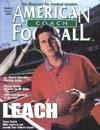Article CategoriesAFM Magazine
|
Traveling ManTexas Tech\'s Mike Leach took a long (and unconventional) path to get to the topby: Brent Schrotenboer Lubbock Avalanche-Journal © More from this issue Somewhere on the road between 19 cities in 11 states, Mike Leach found a way to climb the rope from the small time to the big time. Call it the back-road plan for future coaching success. Leach, the new head coach at Texas Tech, never played college football, never coached at the Division I level until 1997 and never even really knew he wanted to be a football coach until after he earned his law degree from Pepperdine in 1986. After law school, his path was filled with job after job of part-time tasks and secondary incomes on the side. Consider his early career track. His first real coaching assignment came at Cal Poly-San Luis Obispo for $3,000 a year in 1987. Having worked as a substitute teacher that year to make ends meet for his family, he later took a better job as the equipment manager, sports information director an....The full article can only be seen by subscribers.
|
|
|||||||
| HOME |
MAGAZINE |
SUBSCRIBE | ONLINE COLUMNISTS | COACHING VIDEOS |
Copyright 2025, AmericanFootballMonthly.com
All Rights Reserved





